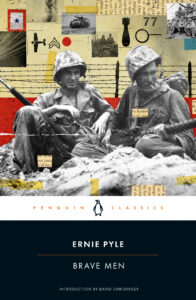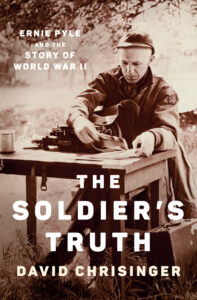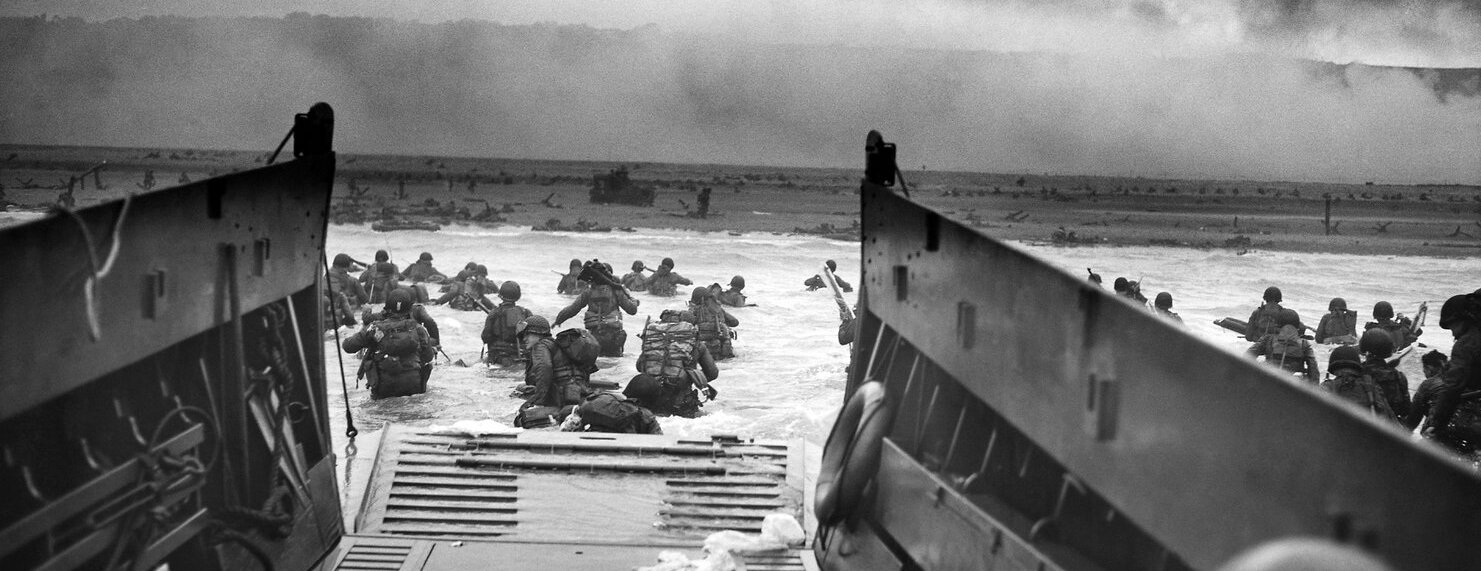“I saw that he was a worried man. It is the worry of a man who has been universally credited with having written the truth. He tried to tell me that you couldn’t really tell it in words. Not war, you couldn’t.”
–Arthur Miller, 1944
*
“Aren’t you Ernie Pyle?” the young man asked. The red cross on his shoulder told Pyle the man was a medic; the insignia on his collar showed he was an officer. Pyle looked up with his graying eyes from a champagne cocktail in the street-level bar of the Hôtel Scribe, a storied establishment across from Opéra National de Paris, which had, until a couple of days prior, served as the regal headquarters for dozens of Nazi propagandists.
Even though Pyle never courted fame, in the late summer of 1944 he was famous, perhaps the most famous, most loved, and most trusted of any American war correspondent before or since. At the peak of its popularity, Pyle’s column ran in more than two hundred daily newspapers and four hundred weeklies.
Two collections of his best columns, Here Is Your War, which covered the North African campaign, and this one you’re reading now, which details Pyle’s journey from Sicily through central Italy and France, were bestsellers. Time magazine put his grinning face on its iconic cover. While he continued reporting from France, Hollywood was producing a movie, The Story of G.I. Joe, based on his columns, and in the weeks leading up to D-Day, Pyle was awarded the Pulitzer Prize for distinguished war correspondence during the year 1943.
“Yes, I am,” Pyle replied. This sort of thing happened wherever he went. There was no such thing as anonymity for the shy farmer’s son from Indiana.
“I just want to thank you,” the medic said earnestly. “You’ve done some great things for us in your column. I read it whenever I can.”
“You won’t be reading it much longer,” Pyle replied, looking back down at his drink, his smile turning more serious as he gently rotates his glass on the tabletop. “I’m going back to the States in a couple of days.”
“Are you?” The medic looked relieved. “By God, I’m glad,” he said. “You’ve seen enough of it.”
Several days later, in a column that would be read by more than twelve million of his adoring readers back home, Pyle broke the news. “I’m leaving for one reason only,” he began, “because I have just got to stop.”
“I’ve been immersed in it too long,” he continued. “My spirit is wobbly and my mind is confused. The hurt has finally become too great.”
He didn’t end things there, though. As with many of the columns he wrote to deliver hard truths, Pyle sprinkled in enough reassurance to keep the overall tone of his final dispatch from the European theater more optimistic than it might otherwise have been.
Pyle showed his readers the true cost of the fighting without resorting to explicit descriptions of blood and mangled bodies.“It may be that a few months of peace will restore some vim to my spirit,” he wrote, “and I can go war-horsing off to the Pacific.”
*
In 1940, after years of living on the road with his wife, Geraldine, as a roving correspondent in Depression-era America, Pyle discovered what would become his professional and spiritual home for the rest of his life: the Second World War in Europe. A series of columns he wrote that year on the destruction wrought by German bombing raids over London alerted one of his bosses to his potential as a foreign correspondent.
Two years later, as America prepared its young army to plunge into another world war, and as Pyle’s personal life plunged to traumatic depths, his bosses at the Scripps-Howard Newspaper Alliance gave Pyle the green light to head overseas for about six months while Geraldine sought care at a sanitarium in a last-ditch effort to get her manic depression under better control. If Pyle’s six-days-per-week column were to take off, great. If not, they all agreed, at least he could rest easier knowing he’d done his bit before coming home to manage the care of his wife.
From the spring of 1942 to the late summer of 1944, Pyle would write more than seven hundred thousand words about “our boys” waging war in North Africa, Sicily, mainland Italy, and France. By living among the troops as an embedded reporter, Pyle gained what he called a “worm’s-eye view” of the war that many take for granted all these decades later.
Before Pyle, there was no way for readers in the United States to reach any sort of understanding about frontline fighting and the day-to-day realities of life at war from someone who had experienced it firsthand. This book draws from the best of Pyle’s prodigious output and includes a great deal of new material Pyle contributed after he decided to leave the war but before the book was published that fall. “It is a deeply human portrait of the American soldiers in action,” Pyle’s fellow newspaperman Joseph F. Dineen wrote of Brave Men for The Boston Globe soon after it was published. “Ernie gives a picture of them in action by writing of ordinary things—what they eat; how they sleep and where; what they talk about; how they react to hunger, dirt, fatigue and danger on a fighting front. He writes as though he were one of them, as in fact he was, and he brings the war very close.” Another contemporary reviewer summed up the impact of Pyle’s book this way: “No one in this war has been able to do as much as he did to transform the blood and sweat of battle into printer’s ink. Or brought the war with such intimacy into more distant homes.”
I personally cherish Brave Men for three main reasons: Pyle’s descriptions of scenes he witnessed; his simple, unassuming style; and his ability to recognize the humanity in everyone he meets. There are so many scenes contained in this book from which I could choose to illustrate this first point; however, the one that immediately comes to mind is the final column in his series on D-Day, titled “A Long Thin Line of Personal Anguish.”
Pyle wrote of what he observed as he strolled along the blood-soaked beaches of Normandy, lost in a silence all his own the day after the invasion. “It extends in a thin little line, just like a high-water mark, for miles along the beach,” he wrote about the detritus of the battle. “Here in a jumbled row for mile on mile are soldiers’ packs. Here are socks and shoe polish, sewing kits, diaries, Bibles and hand grenades. Here are the latest letters from home… Here are toothbrushes and razors, and snapshots of families back home staring up at you from the sand. Here are pocketbooks, metal mirrors, extra trousers and bloody, abandoned shoes.”
These depictions give the overwhelming impression of honest, stunned confusion. Through his eyes, we too are dazed witnesses to the gambles and losses on a scale that nobody back home could comprehend without a narrative that forced some meaning out of the chaos. By allowing the objects he saw in the sand not only to set the scene, but also to tell an eloquent story of loss, Pyle showed his readers the true cost of the fighting without resorting to explicit descriptions of blood and mangled bodies.
“I picked up a pocket Bible with a soldier’s name in it, and put it in my jacket,” Pyle continued. “I carried it half a mile or so and then put it back down on the beach. I don’t know why I picked it up, or why I put it back down.” This eye for detail, what is essentially the eye of a poet, is on full display throughout Brave Men and is a master class in how embedded witnesses can convey the truth about an experience that cannot be fully understood unless it is lived.
In addition to showing the truth more than he preached it, Pyle could string short words together to create the effect of casual, artless, sincere ease. Take, for example, this brief excerpt from the end of what may be Pyle’s most beloved and well-known column, “The Death of Captain Waskow”:
Another man came; I think he was an officer. It was hard to tell officers from men in the half light, for all were bearded and grimy dirty. The man looked down into the dead captain’s face, and then he spoke directly to him, as though he were alive. He said: “I’m sorry, old man.” Then a soldier came and stood beside the officer, and bent over, and he too spoke to his dead captain, not in a whisper but awfully tenderly, and he said: “I sure am sorry, sir.”
Then the first man squatted down, and he reached down and took the dead hand, and he sat there for a full five minutes, holding the dead hand in his own and looking intently into the dead face, and he never uttered a sound all the time he sat there. And finally he put the hand down, and then reached up and gently straightened the points of the captain’s shirt collar, and then he sort of rearranged the tattered edges of his uniform around the wound. And then he got up and walked away down the road in the moonlight, all alone.
Eight sentences. A grand total of 193 words. But only 94 unique words. The most learned language he uses is probably the verb “uttered,” and even that word was no doubt well understood by most of his readers at the time. There’s also no passive voice, no long noun phrases, no late predicates or detached subjects, and there isn’t a single nominalization—all those clumsy writing crutches so many lesser writers unintentionally use that gum up their prose and raise doubts in the readers’ minds about the sincerity and authenticity of the storytelling. As a writer (and teacher of writing) myself, I can attest that it takes great skill to deliver monosyllables in such a natural, pleasing, and objective rhythm. And Pyle was very clever, even if he didn’t always believe that himself.
Perhaps the most important thing I’ve learned from Pyle has to do with the main attribute that seems to have separated him from the rest of his ilk: his deep empathy for humanity, rooted in his experiences battling mental health issues—his wife’s and his own, which I explore in great detail in The Soldier’s Truth, a biography of Pyle during the war. In so much of the heady and imposing commentary that other more “seasoned” war correspondents used, there’s a clear disconnect between the world of abstract politics and campaigns on the one hand, and the world of flesh-and-blood people living their lives as best they can on the other.
Some countries invaded other countries that had to “take up arms.” Cities were then destroyed. Ships were sunk. Ground was lost and gained. That was the war of menacing arrows showing lines of advance in the morning papers. But Pyle knew that wasn’t the true war. The true war, for Pyle, was a war of apathy, disconnection, and misunderstanding—a war that could be won only if the “folks back home” could understand, if they could really see what their sons and sweethearts were suffering through, if they could put a name and a hometown and a personal history on the nameless, faceless divisions of young men slaughtering other young men in the name of freedom. There was a cost to that freedom, Pyle knew all too well, but unless the truth about that cost was made clear, he feared, America would never have what it took to cultivate peace in whatever world was left when the war ended.
That kid, the one who answered his call to serve anyway, that was the kid Pyle knew better than anyone.If swashbuckling tales of heroic deeds in combat couldn’t humanize the American GI, perhaps what could were stories of soldiers like the kid down the block who shipped off the week after graduation, the kid you watched grow up, the kid who’d likely rather be anywhere else but on the front lines in some distant battle. That kid, the one who answered his call to serve anyway, that was the kid Pyle knew better than anyone. And he knew, because he saw firsthand, a war can’t be won without kids like that.
*
Why reprint Brave Men? Why now? The truth is that even though he’s been dead for nearly eight decades, Pyle had so much to say about the world we find ourselves living in today. The horrors of Pyle’s time are different from our own, of course, but not as different as we might like to believe. As I write these words, a great power in Europe spent years systematically flooding the media ecosystem with disinformation before invading a weaker power, simply because its leader convinced himself he must—because he asserted some unimpeachable claim to historical greatness spawned in a climate of mistrust, heightened fear, and despair.
Meanwhile, thousands of men, women, and children are dying, many crushed under the rubble of bombed-out apartment buildings, some left ignominiously at the bottom of mass graves with their hands tied behind their backs. It’s the kind of obscenity the world hasn’t seen in Europe in decades, and it’s a reminder that the stories we tell ourselves matter, and that perhaps the only effective means by which to defeat the untruth is to tell a better story—something Pyle understood, even if he never articulated it exactly that way.
All this leads me to wonder what Pyle would write, if he were with us today, about Russia, Ukraine, and the state of our world. We can never know for sure, but maybe I can offer some clues by taking a closer look at the final chapter of Brave Men. Not long after his conversation with the medic in the street-level bar of the Hôtel Scribe, Pyle was granted permission to return home to his wife in New Mexico.
Before he left Europe for the last time, however, he spent a few days at American general Omar Bradley’s headquarters, on the grounds of the Château de Vouilly, a castle built by the Normans in the tenth century, around the time of the fateful Battle of Hastings.
It’s easy for me to imagine Pyle seated at a dark green folding table, pitched in the shade under an apple tree out past the château’s ancient moat. I can see him pecking at the keys on his typewriter with the broken carriage return. The smoke from a cigarette dangling from his bottom lip quickly dissipates in the farm-fresh breeze. “It could well be that the European war will be over and done by the time you read this book,” he wrote. “Or it might not. But the end is inevitable, and it cannot be put off for long. The German is beaten and he knows it.”
But how did it come about? How were the Allies able to rally together to defeat the Nazis? How were average folks from humble beginnings able to endure so much for so long? Again, I picture him at his table, a pencil in his hand. He’s scribbling out dead-end sentences, or maybe swapping out a clause here and there. I see him stop to breathe in the breeze, the smell of mistletoe in his nose. He tucks the pencil behind his ear, takes a swig of something strong in the cup beside his typewriter, and pokes out his thoughts.
There was the fact that the Axis powers had been weakened from those earlier battles Pyle had seen for himself. He started there. Then there were our brave men, of course, but there was also “Russia, and England, and the passage of time, and the gift of nature’s materials.” We did not prevail, he continued to type, “because destiny created us better than all other peoples.”
It was, in turn, Pyle’s sincerest hope that the hundreds of thousands of words he wrote during the war would lead Americans to show more gratitude than pride, for “the dead men would not want us to gloat.” Instead, he concluded, “All we can do is fumble and try once more—try out of the memory of our anguish—and be as tolerant of each other as we can.”
__________________________________

From Brave Men by Ernie Pyle, published by Penguin Classics, an imprint of Penguin Publishing Group, a division of Penguin Random House, LLC. Introduction copyright © 2023 by David Chrisinger.

David Chrisinger’s The Soldier’s Truth: Ernie Pyle and the Story of World War II is available now from Penguin Press.



